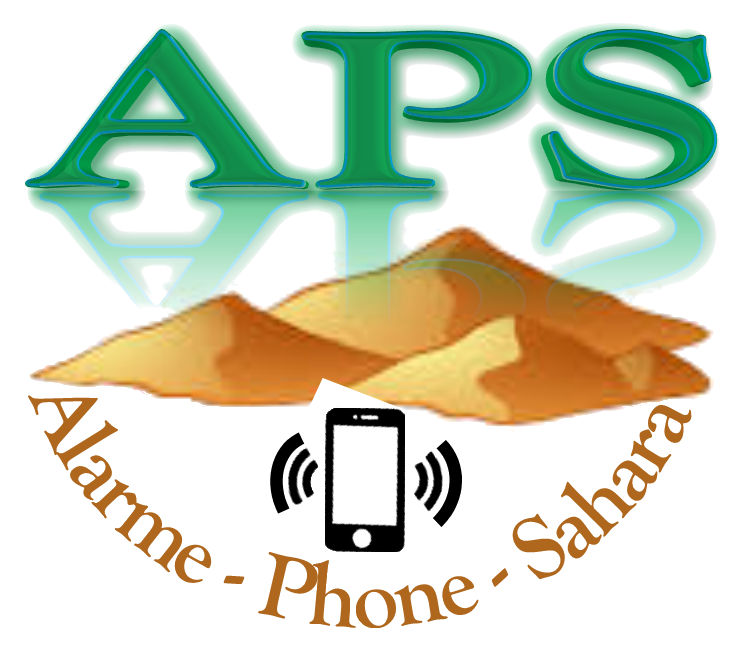From 15 to 22 December 2023, an Alarme Phone Sahara (APS) mission was held in Assamaka, the village on the Niger-Algeria border where most of the transit traffic between Algeria and Niger takes place, but where the deportation convoys with thousands of people deported from Algeria to Niger also arrive. In 2023, at least 26031 people were deported from Algeria to Niger via Assamaka - the highest figure in recent years.
For some time now, APS has had a team of whistleblowers in the locality to assist and rescue deportees and document the situation of these deportations from Algeria over several years.
In practical terms, APS has an office that serves as a parking area for the rescue tricycles, an Internet connection point for migrants when the network is available, and a meeting place for the various players and partners involved in migration issues.
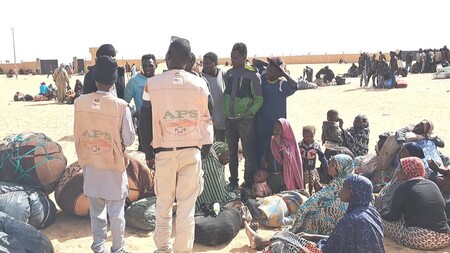
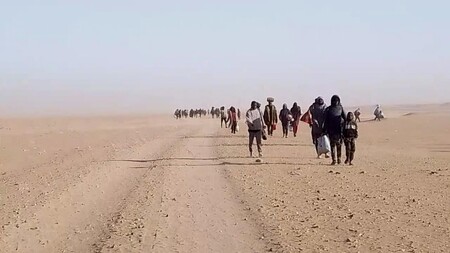
Delegates of Alarme Phone Sahara talking with deportees People walking to Assamaka on foot after deportation from Algeria
©Alarme Phone Sahara ©Alarme Phone Sahara
Meeting with the various players
As mentioned above, the small APS office also serves as a meeting place for the various players, so discussions have been more or less informal, but also very practical and easy. There is good understanding between the APS whistleblowers and the representatives of CIAUD (Comité International pour l'Aide d'Urgence et le Développement), MSF (Médecins sans Frontières), COOPI (Cooperazione Internazionale - an Italian NGO) and even IOM (International Organisation for Migration), because tea is often taken in the APS hangar. So there was no joint meeting during the APS mission, but the APS delegation had individual discussions with each of the representatives:
The CIAUD representative was with the APS delegation throughout the mission, helping them and facilitating their movements in the village. He told them how the situation had evolved during the humanitarian crisis of March 2023, when thousands of deported people were stranded in Assamaka in a situation of severe poverty, and how they had worked together with APS whistleblowers Elh François Ibrahim, Maijakkai and others at that time. And they continue to cooperate whenever there are deportations. At the same time, the latter informed the APS team that, as CIAUD agents, they must stop working from 31 December 2023 until further notice.
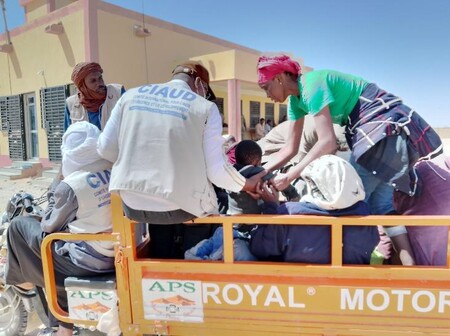
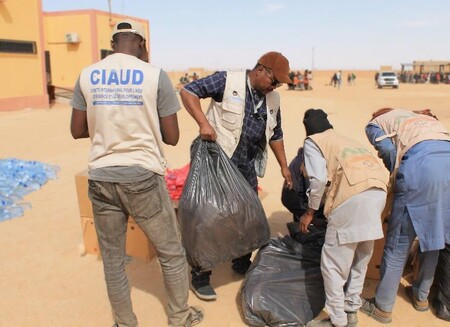
CIAUD members at work together with local APS team ©Alarme Phone Sahara
As always, MSF appreciates the collaboration with APS, which makes a vital contribution to transporting patients between the various points in the village. Even though they have their own vehicle, the rounds and evacuations are carried out using APS tricycles. The APS delegation experienced and documented a case where migrants were in such a situation and used the APS tricycle to transport them to the dispensary for treatment by MSF.
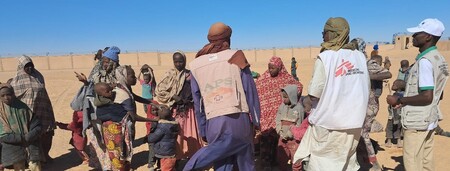
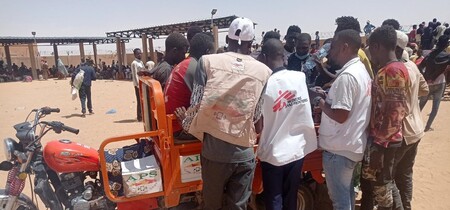
MSF members at work together with local APS team ©Alarme Phone Sahara
On 20 December, the delegation was due to interview a Guinean migrant who was initially in Tunisia, pushed back to Algeria and then pushed back to Niger. But when the APS delegate arrived at the centre, he was vomiting and quite ill. The delegate called the whistleblower Maijakkai, who was on duty that day, and the Guinean man was taken to hospital and cared for by the MSF team.
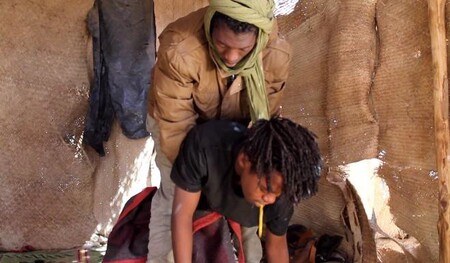
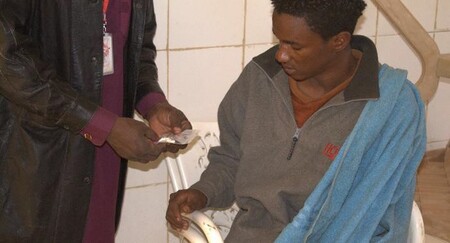
Guinean man assisted by APS whistleblower Maijakkai and taken care of at hospital by MSF ©Alarme Phone Sahara
As for the interviews with police officers, where deportees are registered and have to go through entry formalities after their arrival, talking with COOPI and OIM, the difficulties came to the fore that all these structures have to face, especially the lack of water and hygiene infrastructures (latrines, houses, water supplies, etc.). Above all, these discussions facilitated the delegation's visits to the various centres and the police station, as the mission was present at the arrival of two official and unofficial convoys.
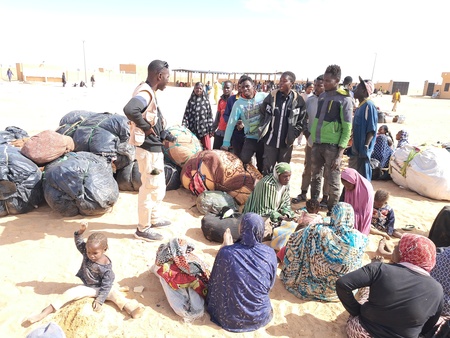
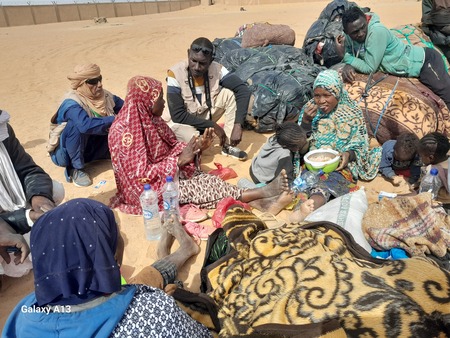
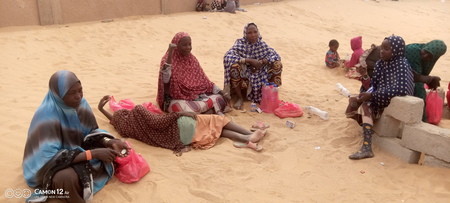
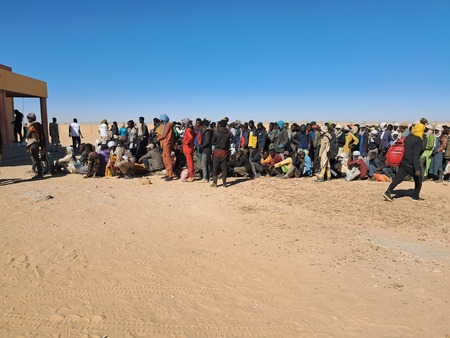
Meeting people deported from Algeria at Assamaka police station ©Alarme Phone Sahara
Visit to Point Zero
The APS team made two trips to Point Zero, 15 km from the village of Assamaka, the first to observe and the second to coincide with the arrival of a so-called pedestrian convoy, in other words an unofficial deportation convoy in which deportees are always dropped off by Algerian forces in the desert at Point Zero and forced to walk to Assamaka on foot. Here too, the delegation was able to cover the rescue work carried out by the whistleblowers.
In this convoy of 21 December 2023 there were 303 people deported, including two women with their babies, one only 8 days old and the other 17 days old. The team urgently provided assistance by taking them in the tricycle to the centre.
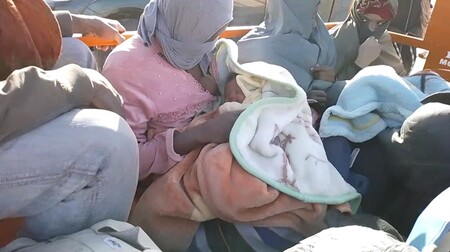
Woman with a new born baby deported from Algeria and dropped of at Point Zero ©Alarme Phone Sahara
Visit and interview with Malian deportees in Assamaka

©Alarme Phone Sahara
Between 343 and 400 households arrived in Assamaka 7 months ago. They had all been deported from Algeria in difficult conditions. Many were brutalised by the security forces, and some had their possessions (phones, money, etc.) taken away from them. They all come from Mali, specifically from the Niger border region, where there are usually terrorist attacks. During the visit, they reported that 4 days earlier, one of their villages had been attacked and that 4 people had been killed and livestock taken away by the terrorists. For this reason, they do not want to return, preferring to stay in Niger and thanking the Nigerien government for welcoming them. They have already been visited by the Governor of the region, the UNHCR and several other NGOs. But so far there has been no official from the Malian government. Nevertheless, the children (around 200) are registered and have started attending Assamaka primary school.
During the interview, the team noted their increased needs, including improved sanitation, guaranteed water supplies, blankets, soap and ointments for this period of cold weather. During the second visit, APS gave them around thirty kettles, which they greatly appreciated and thanked them for.
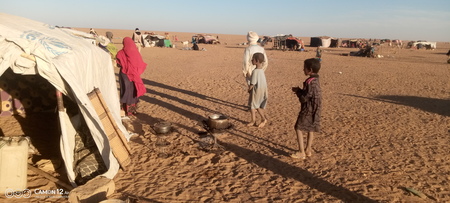
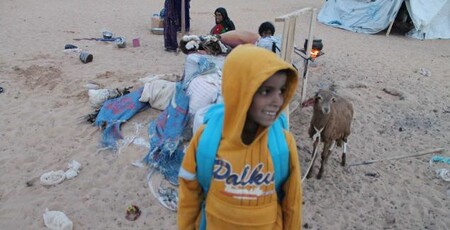
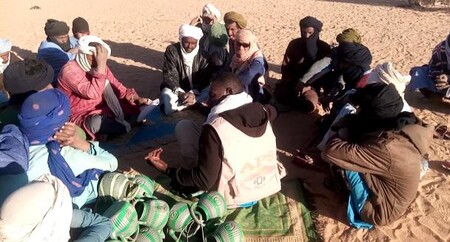
Meeting Malian refugees living at UNHCR facilities in Assamaka ©Alarme Phone Sahara
Visit to the water point
The team made the effort and took the risk of visiting the famous water point where people who have been deported want to return to Algeria, and also where people who are not accepted by the state of Niger (e.g. Syrians, Bangladeshis and others) wait to find a convoy or passage back to Algeria. It's a risk because this place is a no-man's-land where anything can happen. Even the military were surprised by their decision to go there and just wished them good luck.
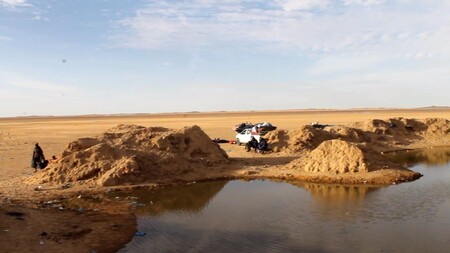
©Alarme Phone Sahara
Conclusion and recommendations
Overall, the situation in Assamaka is as it was before. Admittedly, the crisis at the beginning of 2023 has subsided, but the situation remains critical, given the deplorable and miserable conditions in which the people being deported back are living. The slowness of the administrative process and the changing socio-political context in Niger are also factors. Despite the efforts of the various players, it will not be possible to find an ideal solution as long as the deportations continue.
With regard to the repeal of law 2015-36, according to various people, it is very early to know what the outcome will be. We can only note the joy of the former migration service providers and a mistrust of the drift of those responsible for community life.
At the level of Alarme Phone Sahara, it will be necessary to continue to make the plea against deportations from Algeria, to put pressure by condemning these practices of abuse or infringement of people's rights.
It will also be necessary to increase the available capacity, strengthen the conditions of the APS team on site, improve visibility and provide the office with supplies to make it easier to approach vulnerable people.
Testimonies of migrants stranded in Assamaka, December 2023
Mohammed, a Senegalese citizen deported from Tunisia and Algeria to Assamaka, message translated from Wolof:
"We wanted to go to Tunisia to continue on to Europe. But that didn't work out, we were sent back to Algeria and the Algerians grabbed us and sent us here to the desert, to Assamaka, to an IOM camp here in Assamaka."
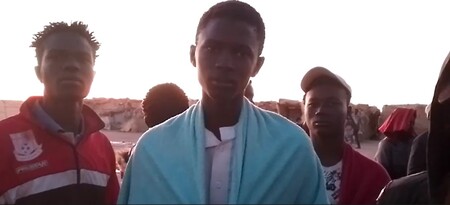
"I greet you, I would like to speak in Wolof, I welcome all Senegalese who are here in Assamaka. Assamaka is on the border between Algeria and Niger.
We wanted to go to Tunisia to continue on to Europe. But that didn't work out, we were sent back to Algeria and the Algerians grabbed us and sent us here to the desert, to Assamaka, to an IOM camp here in Assamaka.
But the situation we are experiencing here is very difficult. We have to ask our families to support us so that we can buy something decent to eat. The food we get here is not good. Some people get sick from it and when they go to the toilet, blood comes out. Some get very sick when they return home, they can even die from it. People are even afraid to eat the food here. Some are forced to eat it because they have no other choice.
We are very very tired and wish that Macky Sall would support us. That Macky Sall helps his citizens because they are very tired and hopeless.
We are very tired, some have been there for three months. People have no more money, we have no proper place to live, and we are experiencing very, very difficult situations. Really, we need help.
If we are caught in Algeria, we will be thrown here, our phones, our money, everything will be taken from us. We no longer have any phones. We have to pay to get in touch with our families.
When our families send us money, so much of it is cut off that it's not even enough for our needs.
We are very, very tired. It's not even possible to eat and drink anything decent.
Really, we are very very tired and we need support from our President Macky Sall before the elections so that his citizens can return and participate in the elections.
Really, we have no more money, we are very very tired."
A Guinean migrant deported from Algeria to Assamaka
"Before I came to Niger, I was in Algeria. I was there for 3 years and I saw a lot. I was tortured."
I'm talking to my President of the Republic, Mamady Doumbouya. We are now in Niger like this. Before I came to Niger, I was in Algeria. I was there for 3 years and I saw a lot. I was tortured. I can't explain it all to you (...).
We are suffering a lot. Please do something for us! The government of Guinea and the other countries, Mali, Ivory Coast, Senegal, Burkina Faso etc., there are a lot of us! But what I'm saying now is that I'm tired. I want to go back to my country. But why do I want to go back to my country? When I go back, I'll have a document. If I'm in my country, I've got the money, I'll get my papers.
But they refuse me. In Algeria, it's the visa. You can't go back to Algeria without a visa. (...)
Governments, if you don't open your eyes and look at what's happening in the desert, we're all going to die here.
We didn't leave just to walk. We left because we want to do something for our country. And when we win, we‘ll get back home to build up something.
(…) The Arabs have beaten and tortured us. They put us in prison. You want to go back to your country, they judge you. Then you're sent to court, tried and given a warrant. In prison, you don't eat. You suffer.
Where I am, I can't say everything. But the government needs to open its eyes and look at what's happening here!
Soumaoro Ismail and another Ivorian man, deported from Tunisia to Algeria and from Algeria to Niger:
"In Tunisia, they beat me up. I thought I was going to die. And then they took all our food, everything that was in our hands. Then they took us in their car and dumped us in the desert."
Hello to the family. My name is Soumaoro Ismail. I'm speaking today on behalf of the people of Ivory Coast. (...) Because we've seen it all (...) Especially in the Maghreb countries. Libya, Algeria and Tunisia.
When I was in Tunisia, they beat me up. The Tunisian police beat me up.
So far, my foot is a bit injured. I limp a bit. When I walk, I limp a bit. When they took me, they threw me out into the desert. I walked 100, 104 kilometres like that to get back to Algeria. And I saw dead people. I saw dead people in the desert, I saw 15 dead people like that.
And they hit us. They hit someone until he was vomiting blood. Even though I showed them my passport, they tore up my passport, they tore up my passport too.
I showed them my passport, I was in Gafsa. Gafsa is in Tunisia. (...) Last week in Tunisia, they beat me up, they beat me up. I thought I was going to die. And then they took all our food, everything that was in our hands. Food, water, they took everything in our hands. Then they took us in their car and dumped us in the desert. We had to walk 50 kilometres to the Algerian border. And the Algerian police caught us and turned us back here.
So, my Ivorian brothers, above all, I also talk a lot to the Head of State, if you see us, help us, we're here.
It's not because there's nothing in our countries, there are many things in our countries. But if you see us going out, it's because we really like Europe. So we want to go to Europe to help our parents a bit. It's not that we don't like our countries, we like our countries. (...)
In all the countries I see, we know we're foreigners. Even in America, there are Black people there, everywhere in the world there are Black people. But I don't understand why in the Maghreb countries, if we're seen, we're mistreated, we suffer a lot there, wallahi, we suffer a lot! We've seen people die in the desert.
(...) You don't have any food, you have to walk for miles. That's not good, wallahi! My feet are swollen! My feet are swollen, even this morning!
Quick exchange of words between Soumaoro Ismail and speaker 2:
"In the deportations, we're caught, we're mistreated like slaves, but we're no longer in the days of slavery!"
"And the mobile phones, they're going to rip them out! But we're not drug dealers! We're just passing through, all the adventurers, we're just passing through! We haven't killed, we're innocent!"
"We've been mistreated like slaves! It's no good, we've got nothing to work with, we're not here to kill!"
"We're not drug dealers or murderers!
"Phones, mobile phones, everything is ripped from you and thrown away, that's racism, that's racism! It's no good! And they kill us Africans! (...)."
"Algeria is Africa! Tunisia is Africa! Morocco is Africa!"
Images from Assamaka
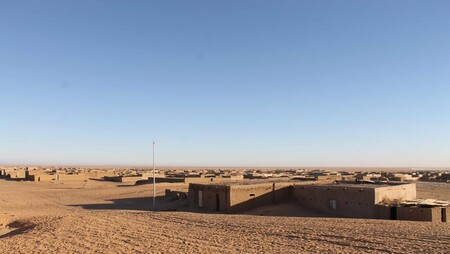
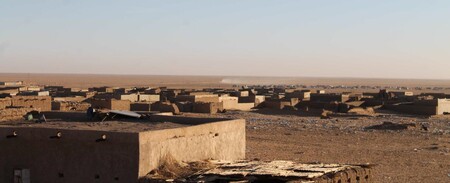
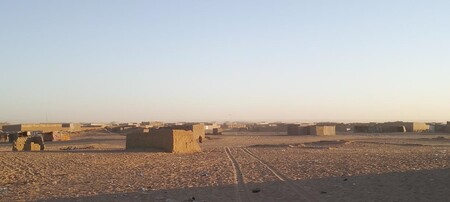
Overview of Assamaka Village ©Alarme Phone Sahara
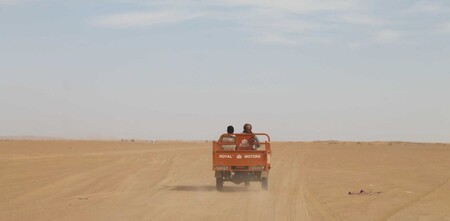
On the move towards Point Zero ©Alarme Phone Sahara
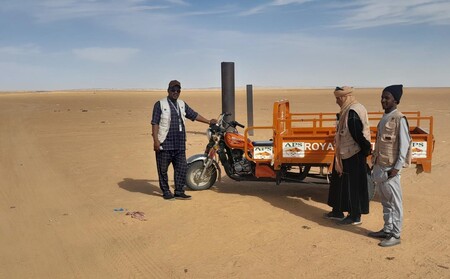
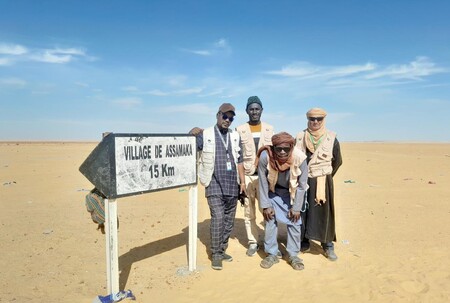
The team at Point Zero ©Alarme Phone Sahara
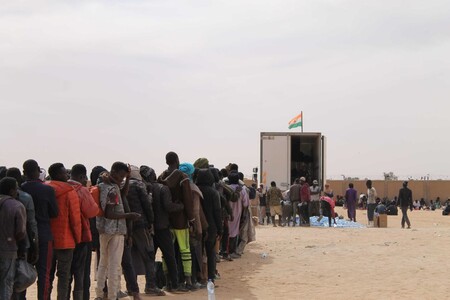
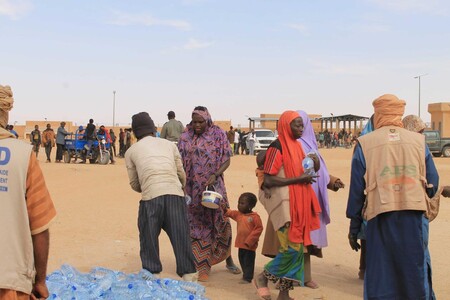
Distribution of kits to people deported from Algeria at Assamaka police station ©Alarme Phone Sahara

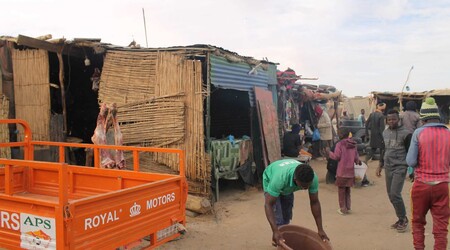
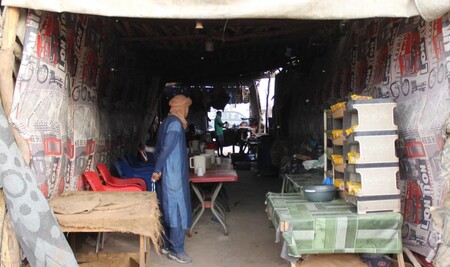
Overview of the Dunes Market ©Alarme Phone Sahara
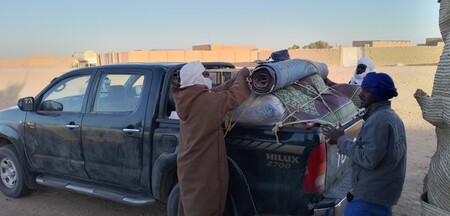
Departure from Assamaka at the end of the mission ©Alarme Phone Sahara
